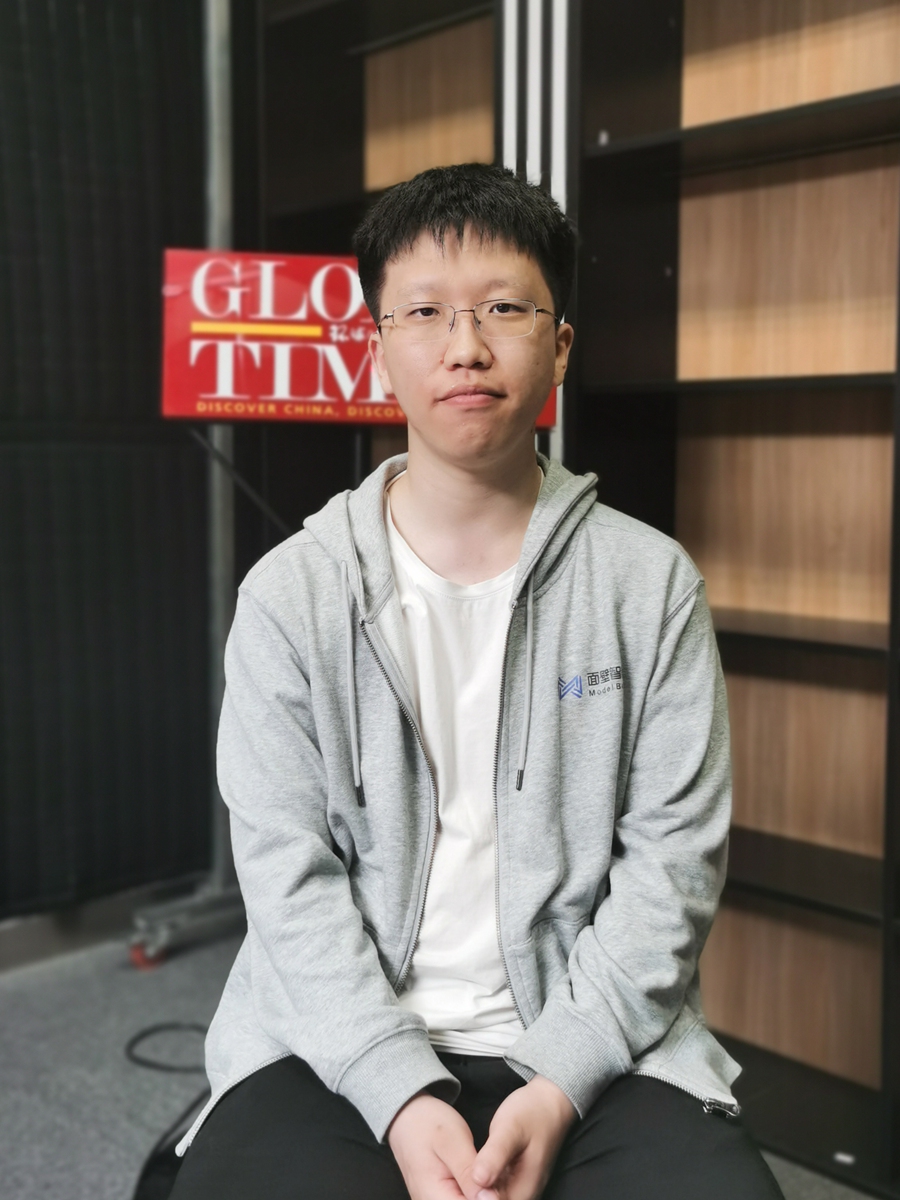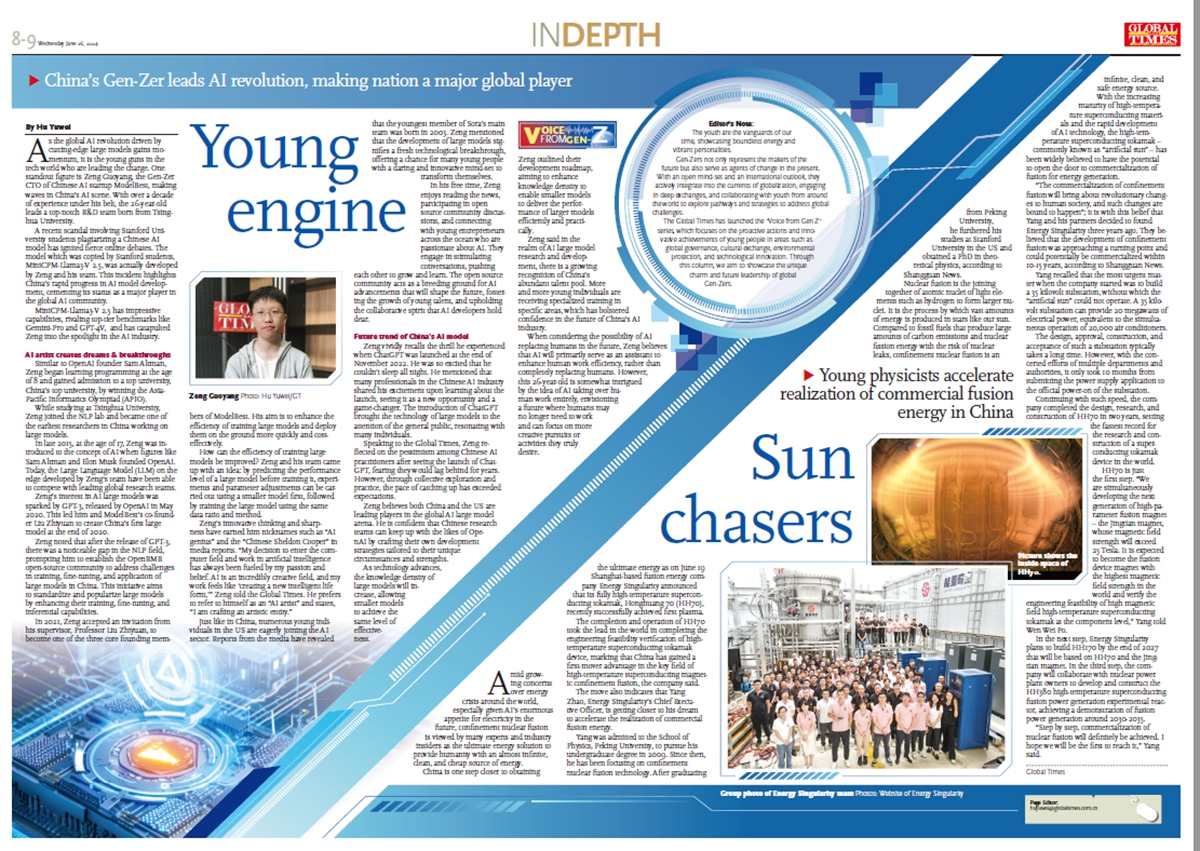IN-DEPTH / IN-DEPTH
China’s Gen-Zer leads AI revolution, making nation a major global player
Young engine
Editor's Note:
The youth are the vanguards of our time, showcasing boundless energy and vibrant personalities.
Gen-Zers not only represent the makers of the future but also serve as agents of change in the present. With an open mind-set and an international outlook, they actively integrate into the currents of globalization, engaging in deep exchanges, and collaborating with youth from around the world to explore pathways and strategies to address global challenges.
The Global Times has launched the "Voice from Gen Z" series, which focuses on the proactive actions and innovative achievements of young people in areas such as global governance, cultural exchange, environmental protection, and technological innovation. Through this column, we aim to showcase the unique charm and future leadership of global Gen-Zers.

As the global AI revolution driven by cutting-edge large models gains momentum, it is the young guns in the tech world who are leading the charge. One standout figure is Zeng Guoyang, the Gen-Zer CTO of Chinese AI startup ModelBest, making waves in China's AI scene. With over a decade of experience under his belt, the 26-year-old leads a top-notch R&D team born from Tsinghua University.
A recent scandal involving Stanford University students plagiarizing a Chinese AI model has ignited fierce online debates. The model which was copied by Stanford students, MiniCPM-Llama3-V 2.5, was actually developed by Zeng and his team. This incident highlights China's rapid progress in AI model development, cementing its status as a major player in the global AI community.
MiniCPM-Llama3-V 2.5 has impressive capabilities, rivaling top-tier benchmarks like Gemini-Pro and GPT-4V, and has catapulted Zeng into the spotlight in the AI industry.
AI artist creates dreams & breakthroughs
Similar to OpenAI founder Sam Altman, Zeng began learning programming at the age of 8 and gained admission to a top university, China's top university, by winning the Asia-Pacific Informatics Olympiad (APIO).
While studying at Tsinghua University, Zeng joined the NLP lab and became one of the earliest researchers in China working on large models.
In late 2015, at the age of 17, Zeng was introduced to the concept of AI when figures like Sam Altman and Elon Musk founded OpenAI. Today, the Large Language Model (LLM) on the edge developed by Zeng's team have been able to compete with leading global research teams.
Zeng's interest in AI large models was sparked by GPT-3, released by OpenAI in May 2020. This led him and ModelBest's co-founder Liu Zhiyuan to create China's first large model at the end of 2020.
Zeng noted that after the release of GPT-3, there was a noticeable gap in the NLP field, prompting him to establish the OpenBMB open-source community to address challenges in training, fine-tuning, and application of large models in China. This initiative aims to standardize and popularize large models by enhancing their training, fine-tuning, and inferential capabilities.
In 2021, Zeng accepted an invitation from his supervisor, Professor Liu Zhiyuan, to become one of the three core founding members of ModelBest. His aim is to enhance the efficiency of training large models and deploy them on the ground more quickly and cost-effectively.
How can the efficiency of training large models be improved? Zeng and his team came up with an idea: by predicting the performance level of a large model before training it, experiments and parameter adjustments can be carried out using a smaller model first, followed by training the large model using the same data ratio and method.
Zeng's innovative thinking and sharpness have earned him nicknames such as "AI genius" and the "Chinese Sheldon Cooper" in media reports. "My decision to enter the computer field and work in artificial intelligence has always been fueled by my passion and belief. AI is an incredibly creative field, and my work feels like 'creating a new intelligent life form,'" Zeng told the Global Times. He prefers to refer to himself as an "AI artist" and states, "I am crafting an artistic entity."
Just like in China, numerous young individuals in the US are eagerly joining the AI sector. Reports from the media have revealed that the youngest member of Sora's main team was born in 2003. Zeng mentioned that the development of large models signifies a fresh technological breakthrough, offering a chance for many young people with a daring and innovative mind-set to transform themselves.
In his free time, Zeng enjoys reading the news, participating in open source community discussions, and connecting with young entrepreneurs across the ocean who are passionate about AI. They engage in stimulating conversations, pushing each other to grow and learn. The open source community acts as a breeding ground for AI advancements that will shape the future, fostering the growth of young talent, and upholding the collaborative spirit that AI developers hold dear.

Future trend of China's AI model
Zeng vividly recalls the thrill he experienced when ChatGPT was launched at the end of November 2022. He was so excited that he couldn't sleep all night. He mentioned that many professionals in the Chinese AI industry shared his excitement upon learning about the launch, seeing it as a new opportunity and a game-changer. The introduction of ChatGPT brought the technology of large models to the attention of the general public, resonating with many individuals.
Speaking to the Global Times, Zeng reflected on the pessimism among Chinese AI practitioners after seeing the launch of ChatGPT, fearing they would lag behind for years. However, through collective exploration and practice, the pace of catching up has exceeded expectations.
Zeng believes both China and the US are leading players in the global AI large model arena. He is confident that Chinese research teams can keep up with the likes of OpenAI by crafting their own development strategies tailored to their unique circumstances and strengths.
Zeng emphasized that the key to success lies in the efficiency, rather than the sheer quantity, of large models. He envisions a future where large models diversify into various forms, akin to one way of the evolution of computers from room-sized machines to personal devices like laptops and smartphones, while another way focusing on supercomputers for more complex problems. He foresees a differentiation in large models, with some optimized for end-side devices like theirs, while others evolve into dynamic models for complex tasks.
As technology advances, the knowledge density of large models will increase, allowing smaller models to achieve the same level of effectiveness. Zeng outlined their development roadmap, aiming to enhance knowledge density to enable smaller models to deliver the performance of larger models efficiently and practically.
Zeng said in the realm of AI large model research and development, there is a growing recognition of China's abundant talent pool. More and more young individuals are receiving specialized training in specific areas, which has bolstered confidence in the future of China's AI industry.
When considering the possibility of AI replacing humans in the future, Zeng believes that AI will primarily serve as an assistant to enhance human work efficiency, rather than completely replacing humans. However, this 26-year-old is somewhat intrigued by the idea of AI taking over human work entirely, envisioning a future where humans may no longer need to work and can focus on more creative pursuits or activities they truly desire.

The youth are the vanguards of our time, showcasing boundless energy and vibrant personalities.
Gen-Zers not only represent the makers of the future but also serve as agents of change in the present. With an open mind-set and an international outlook, they actively integrate into the currents of globalization, engaging in deep exchanges, and collaborating with youth from around the world to explore pathways and strategies to address global challenges.
The Global Times has launched the "Voice from Gen Z" series, which focuses on the proactive actions and innovative achievements of young people in areas such as global governance, cultural exchange, environmental protection, and technological innovation. Through this column, we aim to showcase the unique charm and future leadership of global Gen-Zers.

Photo: VCG
As the global AI revolution driven by cutting-edge large models gains momentum, it is the young guns in the tech world who are leading the charge. One standout figure is Zeng Guoyang, the Gen-Zer CTO of Chinese AI startup ModelBest, making waves in China's AI scene. With over a decade of experience under his belt, the 26-year-old leads a top-notch R&D team born from Tsinghua University.
A recent scandal involving Stanford University students plagiarizing a Chinese AI model has ignited fierce online debates. The model which was copied by Stanford students, MiniCPM-Llama3-V 2.5, was actually developed by Zeng and his team. This incident highlights China's rapid progress in AI model development, cementing its status as a major player in the global AI community.
MiniCPM-Llama3-V 2.5 has impressive capabilities, rivaling top-tier benchmarks like Gemini-Pro and GPT-4V, and has catapulted Zeng into the spotlight in the AI industry.
AI artist creates dreams & breakthroughs
Similar to OpenAI founder Sam Altman, Zeng began learning programming at the age of 8 and gained admission to a top university, China's top university, by winning the Asia-Pacific Informatics Olympiad (APIO).
While studying at Tsinghua University, Zeng joined the NLP lab and became one of the earliest researchers in China working on large models.
In late 2015, at the age of 17, Zeng was introduced to the concept of AI when figures like Sam Altman and Elon Musk founded OpenAI. Today, the Large Language Model (LLM) on the edge developed by Zeng's team have been able to compete with leading global research teams.
Zeng's interest in AI large models was sparked by GPT-3, released by OpenAI in May 2020. This led him and ModelBest's co-founder Liu Zhiyuan to create China's first large model at the end of 2020.
Zeng noted that after the release of GPT-3, there was a noticeable gap in the NLP field, prompting him to establish the OpenBMB open-source community to address challenges in training, fine-tuning, and application of large models in China. This initiative aims to standardize and popularize large models by enhancing their training, fine-tuning, and inferential capabilities.
In 2021, Zeng accepted an invitation from his supervisor, Professor Liu Zhiyuan, to become one of the three core founding members of ModelBest. His aim is to enhance the efficiency of training large models and deploy them on the ground more quickly and cost-effectively.
How can the efficiency of training large models be improved? Zeng and his team came up with an idea: by predicting the performance level of a large model before training it, experiments and parameter adjustments can be carried out using a smaller model first, followed by training the large model using the same data ratio and method.
Zeng's innovative thinking and sharpness have earned him nicknames such as "AI genius" and the "Chinese Sheldon Cooper" in media reports. "My decision to enter the computer field and work in artificial intelligence has always been fueled by my passion and belief. AI is an incredibly creative field, and my work feels like 'creating a new intelligent life form,'" Zeng told the Global Times. He prefers to refer to himself as an "AI artist" and states, "I am crafting an artistic entity."
Just like in China, numerous young individuals in the US are eagerly joining the AI sector. Reports from the media have revealed that the youngest member of Sora's main team was born in 2003. Zeng mentioned that the development of large models signifies a fresh technological breakthrough, offering a chance for many young people with a daring and innovative mind-set to transform themselves.
In his free time, Zeng enjoys reading the news, participating in open source community discussions, and connecting with young entrepreneurs across the ocean who are passionate about AI. They engage in stimulating conversations, pushing each other to grow and learn. The open source community acts as a breeding ground for AI advancements that will shape the future, fostering the growth of young talent, and upholding the collaborative spirit that AI developers hold dear.

Zeng Guoyang Photo: Hu Yuwei/GT
Future trend of China's AI model
Zeng vividly recalls the thrill he experienced when ChatGPT was launched at the end of November 2022. He was so excited that he couldn't sleep all night. He mentioned that many professionals in the Chinese AI industry shared his excitement upon learning about the launch, seeing it as a new opportunity and a game-changer. The introduction of ChatGPT brought the technology of large models to the attention of the general public, resonating with many individuals.
Speaking to the Global Times, Zeng reflected on the pessimism among Chinese AI practitioners after seeing the launch of ChatGPT, fearing they would lag behind for years. However, through collective exploration and practice, the pace of catching up has exceeded expectations.
Zeng believes both China and the US are leading players in the global AI large model arena. He is confident that Chinese research teams can keep up with the likes of OpenAI by crafting their own development strategies tailored to their unique circumstances and strengths.
Zeng emphasized that the key to success lies in the efficiency, rather than the sheer quantity, of large models. He envisions a future where large models diversify into various forms, akin to one way of the evolution of computers from room-sized machines to personal devices like laptops and smartphones, while another way focusing on supercomputers for more complex problems. He foresees a differentiation in large models, with some optimized for end-side devices like theirs, while others evolve into dynamic models for complex tasks.
As technology advances, the knowledge density of large models will increase, allowing smaller models to achieve the same level of effectiveness. Zeng outlined their development roadmap, aiming to enhance knowledge density to enable smaller models to deliver the performance of larger models efficiently and practically.
Zeng said in the realm of AI large model research and development, there is a growing recognition of China's abundant talent pool. More and more young individuals are receiving specialized training in specific areas, which has bolstered confidence in the future of China's AI industry.
When considering the possibility of AI replacing humans in the future, Zeng believes that AI will primarily serve as an assistant to enhance human work efficiency, rather than completely replacing humans. However, this 26-year-old is somewhat intrigued by the idea of AI taking over human work entirely, envisioning a future where humans may no longer need to work and can focus on more creative pursuits or activities they truly desire.



